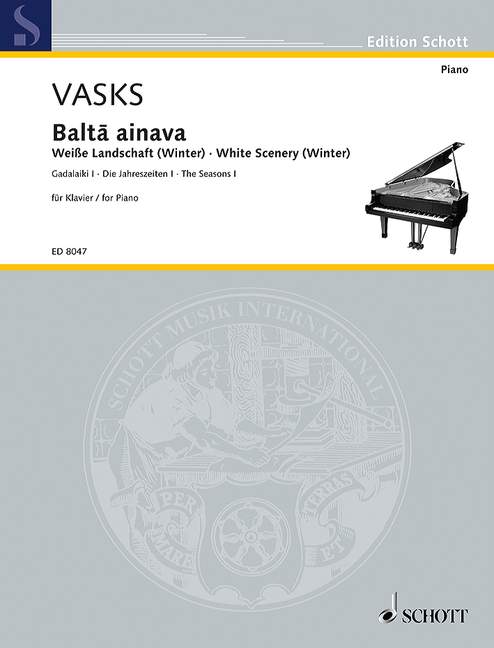
Balta ainava (White Scenery (Winter)) 瓦斯克斯 钢琴独奏 朔特版
彼得斯-瓦斯克斯在波罗的海作曲家圈中占有特殊地位。 他不仅是拉脱维亚有史以来最重要、最受欢迎的作曲家,而且总是以一种狂热的激情向听众倾诉,似乎指向某种更高的东西。 毫无疑问,这种更崇高的东西既高于人类世界,也存在于每个人的内心:神性。 "我深深植根于自然,植根于北方的自然。它影响着我所有的音乐。我们所了解的大自然也是多种多样的;我们有非常分明的四季。 冬天很长,夏天很短,因此更加美丽和令人向往。中间的季节则颇具戏剧性"。 彼得斯-瓦斯克斯的第一首《四季》并不是为了组成一个完整的乐章而创作的。 1980 年,他为朋友塔利瓦尔迪斯-德克斯尼斯(Talivaldis Deksnis)创作了《白色风景(冬)》(Balta ainava),1981 年创作了《秋乐》(Rudens muzika),1995 年创作了《春乐》(Pavasara muzika)。2008 年,《绿色风景(夏)》(Zala ainava)问世,完成了整个周期的创作。 2009 年,作为 "安可曲",瓦斯克斯根据旧草图创作了《夏夜音乐》(Vasaras vakara muzika);在所有作品中,这首作品最能体现传统。只有两首最新的作品--都与夏天有关--有固定的节拍结构。 早期的三部作品则是自由节拍,没有小节线,因此具有即兴创作的特点。 瓦斯茨在谈到这部作品时说:"在 Balta ainava 中,一切都是自由的: "在巴尔塔阿纳瓦,一切都是白色的。新的一年开始了。这是一个安静的冥想,一个新的开始,只有两个主题。Pavasara muzika。Quasi una Sonata》是这首乐曲中要求最高的作品,曲调强烈,发展令人印象深刻。 春天姗姗来迟,充满戏剧性。 它就像一场战斗,直到结束。这首带有鸟鸣的多面性乐曲从冲突和戏剧性的强化中诞生,最后在狂喜中结束。Zala ainava》基于两个主题。我们的夏天非常短暂,是战斗之后的喘息之机。它是如此美丽!音乐反映了欢乐和满足。第一个主题带来了一种纯粹的活力;第二个主题则更多地表现了音色。最后,乐曲引用了一首著名的拉脱维亚民谣中关于醉汉的五个音符。Rudens muzika》在宁静的九月天,在祥和、阳光明媚的气氛中以钢琴小调开始。 现在,秋天的暴风雨席卷了大地;人们和大自然都沉浸在温柔的悲伤之中,放弃了自己的辉煌。 在最后一场大风暴之后,雪再次降临,象征着净化的结束和新的开始。Vasaras vakara muzika 发生在夏日宁静的尾声。夕阳西下。缓慢。对之前经历的回忆浮现。随着回忆的出现,强度也随之增加。最后,人们听到了一首民谣:"我们在暴政时期幸存下来,并保留了我们的身份"。结局是安静的,一切都沉睡了"。克里斯托夫-施吕伦 译者:约翰-帕特里克-托马斯和 W. 理查德-雷蒙德 约翰-帕特里克-托马斯和 W. 理查德-里夫斯
作曲家: Vasks, Peteris
乐器: piano
出版社: Schott Music
原文简介:
Peteris Vasks occupies a special position in the circle of Baltic composers. He is not only the most significant and popular composer ever to come out of Latvia; he always speaks to his listeners with a fervent intensity that seems to point to something higher. This higher aspect is without a doubt something that stands above the world of humanity but is also present within each person: divine nature. “I am deeply rooted in nature, in the nature of the North. It influences all of my music. The nature we know is also quite various; we have four very distinct seasons. The winter is very long, the summer very short and therefore all the more beautiful and longed for. The seasons in between are quite dramatic.” The first of Peteris Vasks’s Seasons pieces was not written with the intention of forming a complete cycle. For his friend, Talivaldis Deksnis, he composed in 1980 Balta ainava – White Landscape (Winter), in 1981 Rudens muzika – Autumn Music, and in 1995 the Pavasara muzika – Spring Music. In 2008, Zala ainava – Green Landscape (Summer) came into being, the piece which completed the cycle. In 2009, as a kind of “encore“, Vasks wrote Vasaras vakara muzika – Music for a Summer Evening based on old sketches; this, of all the pieces, is the one most anchored in tradition. Only the two newest pieces – both of which have to do with summer – have a fixed metrical structure. The three earlier works are metrically free, notated without bar lines, which gives them an improvisatory character. Vasks says of the individual pieces in the cycle: “In Balta ainava everything is white. A new year begins. It is a quiet meditation, a new beginning, with only two themes. Pavasara muzika. Quasi una Sonata – the most demanding piece in this cycle – is intense, an impressive development. Spring comes slowly, with much drama. It is like a battle, until it is simply there. This multi-faceted piece, with its bird songs, lives from conflicts and dramatic intensification and ends in ecstatic rapture. Zala ainava is based on two themes. Our summer is very brief and offers a respite after the battles. And it is so beautiful! The music reflects joy and contentment. The first theme brings a kind of pure energy; the second is more devoted to tone painting. At the end, a five-note quotation from a well-known Latvian folksong about a drunkard is heard. Rudens muzika begins pianissimo on a quiet September day, in a peaceful, sunny atmosphere. Now the autumn storms sweep over the land; a gentle sadness settles on the people and on nature, which surrenders its splendor. After a last great storm, the snow comes again as a symbol of purified conclusion and a new beginning. Vasaras vakara muzika takes place at the quiet end of a summer day. The sun sets. Slowness. Memories of previous experiences surface. With the memories’ appearance comes an increase in intensity. Towards the end, a kind of folksong is heard: ‘We have survived the time of tyranny and retained our identity’. The ending is quiet, everything is asleep.“ Christoph Schlüren Translation: John Patrick Thomas and W. Richard Rieves
